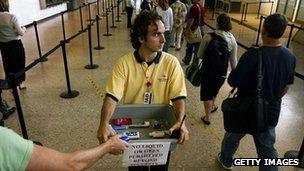Names on US no-fly list 'double' after Christmas plot
- Published

Critics have said the secrecy surrounding the no-fly lists violate the rights of those whose names are on it
The US terrorism no-fly list has doubled in the last year, the Associated Press reports.
Names have risen from 10,000 to 21,000 after the US lowered criteria to get on the list, following the "underpants bomber" plot of December 2009.
Most of those on the list are foreigners, but it is said to include about 500 Americans.
The government will not disclose the names of those on the no-fly list, or say why they have been included on it.
John Pistole, Transport Security Administrator, told the Associated Press news agency in a report published on Thursday: "Both US intelligence and law enforcement communities and foreign services continue to identify people who want to cause us harm, particularly in the US and particularly as it relates to aviation."
One of the most significant changes to the government's criteria for placing people on the terrorist watch list is that the individual does not have to be suspected only as a threat to aviation.
People who have attended terror training camps or who could potentially represent a broader threat can now be included on the no-fly list, a counter-terrorism official told the Associated Press news agency.
Umar Farouk Abdulmutallab, the Nigerian who admitted trying to detonate explosives in his underpants while on a Detroit-bound airliner in Christmas 2009, was on a US watch-list, but was not on the no-fly list.
In the wake of that attempted attack, government agencies were ordered to review their files to add new names to the no-fly lists that qualified under the new criteria.
As this review comes to an end, the rate at which new names are added to the list is expected to slow.
- Published12 October 2011